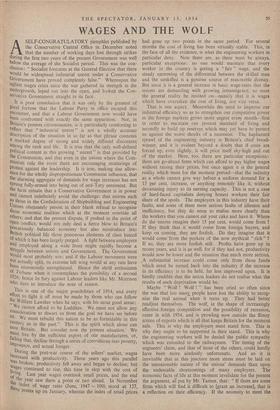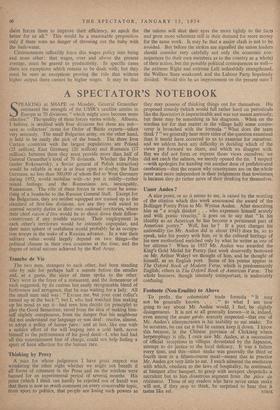WAGES AND THE WOLF
SELF-CONGRATULATORY pamphlet published by the Conservative Central Office in December noted that the number of working days lost through strikes during the first two years of the present Government was well below the average of the Socialist period. This was the con- clusion: " Socialist forecasts at the General Election that there would be widespread industrial unrest under a Conservative Government have proved completely false." Whereupon the ugliest wages crisis since the war gathered its strength in the undergrowth, loped out into the open, and looked the Con- servative Government straight in its face.
It is poor consolation that it was only by the greatest of good fortune that the Labour Party in office escaped this encounter, and that a Labour Government now would have been confronted with exactly the same apparition. Nor, in Britain's present circumstances, is it particularly comforting to reflect that " industrial unrest " is not a wholly accurate description of the situation in so far as that phrase connotes a marked degree of strong and widely diffused discontent among the rank and file. It is true that, the only well-defined political content in. this growing " unrest " is that provided by the Communists, and that even in the unions where the Com- munists rule the roost there are encouraging mutterings of protest against the leadership. It is true, making due allow- ance for the wholly disproportionate Communist influence, that the alarming aggregate of demands for wage increases has not sprung fully-armed into being out of anti-Tory sentiment. But the facts remain that a Conservative Government is in power and cannot indefinitely avoid the challenge; that unions such as those in the Confederation of Shipbuilding and Engineering Unions obstinately persist in their blank refusal to recognise those economic realities which at the moment override all others; and that the present dispute, if pushed to the point of open conflict, would not only deal a fierce blow to Britain's precariously balanced economy but also reintroduce into British political life those poisonous elements of class hatred of which it has been largely purged. A fight between employers and employed along a wide front might rapidly become a struggle between unions and Government. The Government Wonld most probably win; and if the Labour movement were not actually split, its extreme left wing would at any rate have been enormously strengthened. Hence the shrill enthusiasm of Tribune when it contemplates the possibility of a second 1926; hence its fury against Labour leaders like Mr. Morrison Who dare to introduce the note of reason.
This is one of the major possibilities of 1954, and every effort to fight it off must be made by those who can follow Sir William Lawther when he says, with his stout good sense: We cannot afford to be Luddites. We must not allow any Consideration to thwart us from the goal we have set before us. We must rebuild this nation to be as formidable in this century as in the past." This is the spirit which alone can save. Britain. But consider now the present situation. We Must live by the sufficient export of our manufactures, or, failing that, decline through a series of convulsions into poverty, Impotence, and actual hunger. During the post-war course of the sellers' market, wages Increased with productivity. Three years ago this parallel was broken; productivity fell away and began to decline; but ;!ages continued to rise, this time in step with the cost of 1.ving. Last year wages overtook retail prices, and the end ,v,1 the year saw them a point or two ahead. In November three index of wage rates (June, 1947 = 100), stood at 137, 'tree points up on January, whereas the index of retail prices had gone up two points in the same period. For several months the cost of living has been virtually stable. This, in the face of all the evidence, is what the engineering workers in particular deny. Now there are, as there must be always, particular exceptions: no one would maintain that every worker in the country is getting a " fair " wage, and the steady narrowing of the differential between the skilled man and the unskilled is a genuine source of reasonable dismay.
But since it is a general increase in basic wage-rates that the unions are demanding with growing intransigence, so must the general reality be insisted on—namely that it is wages which have overtaken the cost of living, not vice versa.
That is one aspect. Meanwhile the need to improve our industrial efficiency so as to strengthen our competitive power in the foreign markets grows more urgent event' month—first in order to maintain our present standard of living and secondly to build up reserves which may yet have to protect us against the worst shocks of a recession. The haphazard sprawl of the engineering industry is Britain's chief bread- winner, and it is evident 'beyond a doubt that if costs are forced up, even slightly, it will price itself sky-high and out of the market. Here, too, there are particular exceptions: there are go-ahead firms which can afford to pay higher wages without raising their prices, but once again it is the general reality which must for the moment prevail—that the industry as a whole cannot give way before a uniform demand for a 15 per cent. increase, or anything remotely like it, without devastating injury to its earning capacity. This is not a case of hard-faced capitalists denying honest workers their fair share of the spoils. The employers in this industry have their faults, and some of them most serious faults of idleness and inefficiency, but they do seem to realise more clearly than the workers that you cannot eat your cake and have it. Where do the unions imagine their 15 per cent. would come from ?
If they think that it would come from foreign buyers, and keep on coming, they are foolish. DO they imagine that it would come 'from the pockets of the now mythical " rich" ?
If so, they are more foolish still. Profits have gone up in recent years, and it is as well, for if they had not, productivity would now be lower and the situation that much more serious.
A substantial increase could come only from those funds which must be turned back into the industry if the increase in its efficiency is to be held, far less improved upon. It is hardly credible that' the union leaders do not realise what the results of such deprivation would be.
Maybe " Wolf ! Wolf ! " has been cried so often since the war that too many people have lost the ability to recog- nise the real animal when it turns up. They had better readjust themselves. The wolf, in the shape of increasingly effective .foreign competition and the possibility of recession, came in with 1954, and is prowling now outside the flimsy screen of exports which is all that keeps Britain for the moment safe. This is why the employers must stand firm. This is why they ought to he supported in their stand. This is why the engineering workers will be denied' the public sytnpathy which was extended to the railwaymen. The timing of the engineers' claim, and that of most of the others, could hardly have been more aimlessly unfortunate. And so it is inevitable that at this juncture more stress must be laid on the unreasonable nature of the unions' demands than upon the undeniable shortcomings of many employers. The economic facts of life at this moment invalidate for the present the argument, as put by Mr. Tanner, that: " If there are some firms which will find it difficult to [grant an increase], that is a reflection on their efficiency. If the necessity to meet the claim forces them to improve their efficiency, so much the better for us all." This would be a reasonable proposition only if there were no danger of throwing out the baby with the bath-water.
Circumstances inflexibly force this wages policy into being and none other: that wages, over and above the present average, must be geared to productivity. In specific cases .there are exceptions which remain to be dealt with; but they must be seen as exceptions proving the rule that without higher output there cannot be higher wages. It may be that the unions will shut their eyes the more tightly to the facts and grow more vehement still in their demand for more money for the same work. It may be that a major clash is not to be avoided. But before the strikes are signalled the union leaders should consider very carefully not only the economic con- sequences (to their own members as to the country as a whole) of their action, but the possible political consequences as well— the extreme Right and extreme Left unhealthily strengthened, the Welfare State weakened, and the Labour Party hopelessly divided. Would this be an improvement on the present state ?



































 Previous page
Previous page